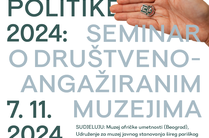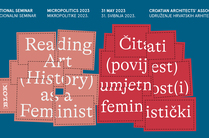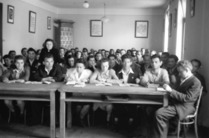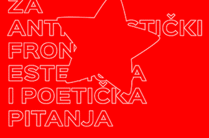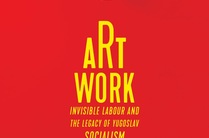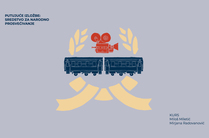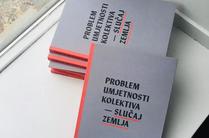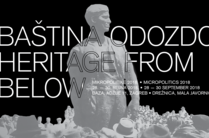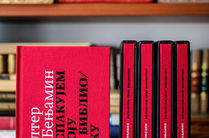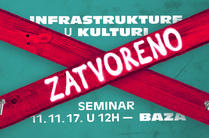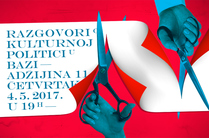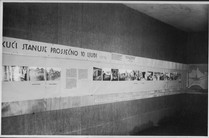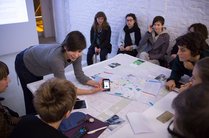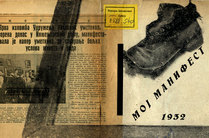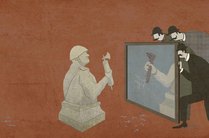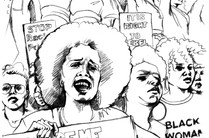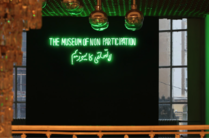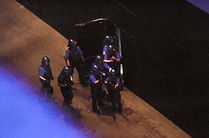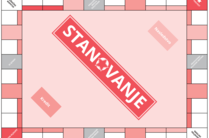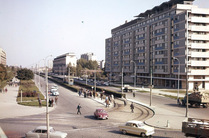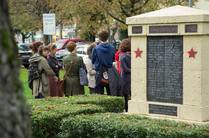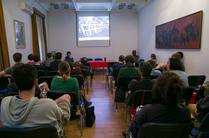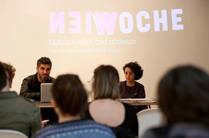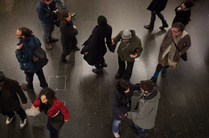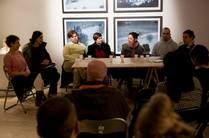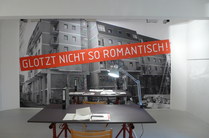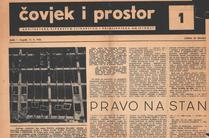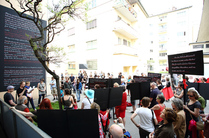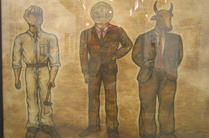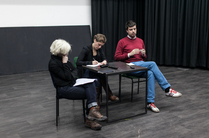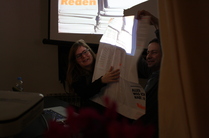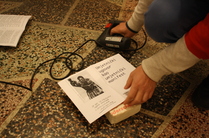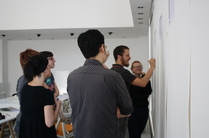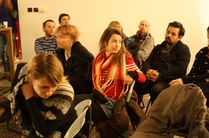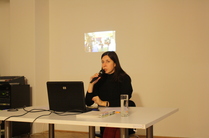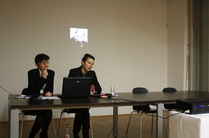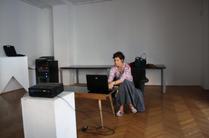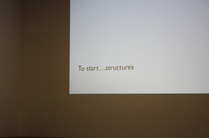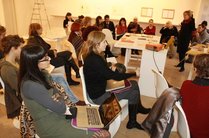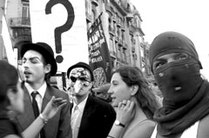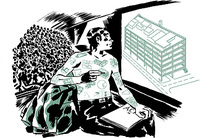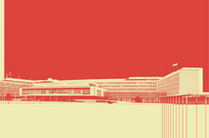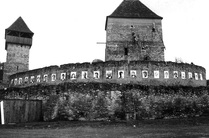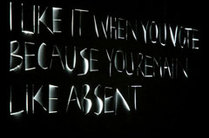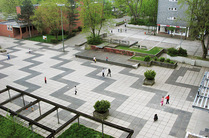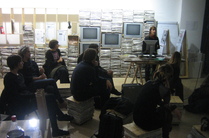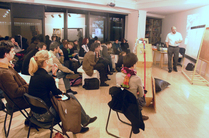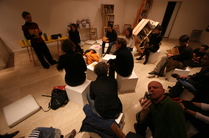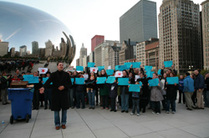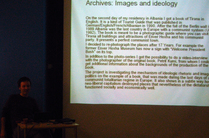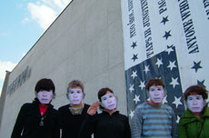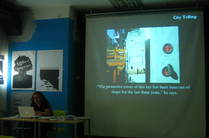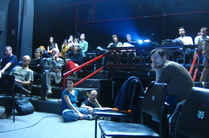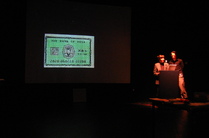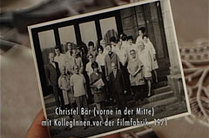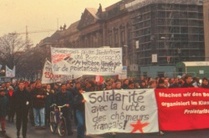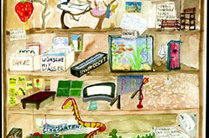ARTISTS FOR THE ANTIFASCIST FRONT: POETIC AND AESTHETIC QUESTIONS
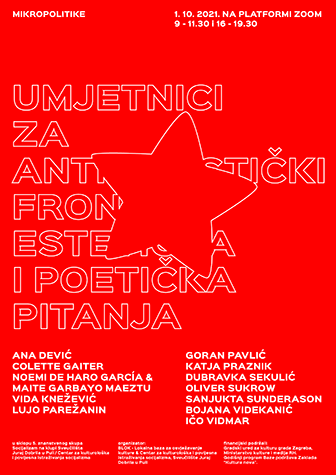
October 1, 2021
9 - 11.30 AM & 4 - 6.30 PM
via Zoom platform
link: https://unipu-hr.zoom.us/webinar/register/WN_yO_W5sMnTfqTTn4V4pxoiA
Participants must register at least a day before the conference.
This year's edition of the Micropolitics program brings together researchers of socially engaged artistic practices of the 20th century in the field of fine arts and literature, which, throughout that entire period, oscillated between new reception paradigms and old formal methods. Despite their global prevalence, these practices remained on the margins of the canon and were condemned for their tendentiousness and formal and material subordination to the political needs of progressive social forces. Starting from this, we have decided to open space for new narratives, focusing on the role that socially engaged art played in the struggle against fascism, racism and colonialism by capturing a wide range of socio-political events of the short 20th century.
The first panel is dedicated to the history of socially engaged art in the interwar period, and covers the work of artists in the Spanish Civil War, the conflict on the literary Left, the connection between the labor movement and Yugoslav critical realism, Partisan art, especially artistic production in concentration camps and internment, as well as historical avant-gardes, from the perspective of their effect on production relations within the Western institution of art.
The second session focuses on post-war events: the role of artists in the processes of decolonization of India, East German socialist realism and muralism in the 1960s, the question of the character of Yugoslav socialist realism, critical analysis and ideological contextualization of the academic treatment of Ivan Goran Kovačić's poetry and a reconsideration of the history of class violence on the example of Adamič's "Dynamite". We end the session with a presentation on really useful knowledge, created in 19th century British workers' clubs, affirming an engaged approach in the context of academic knowledge production.
This year’s edition of the educational program Micropolitics takes place in a panel format at the international conference „Socialism on the Bench“, organized by the Center for Cultural and Historical Research of Socialism at Juraj Dobrila University of Pula, Croatia.
Both panels will be held in English.
PROGRAM
9 – 11.30 AM
moderator: Ivana Hanaček, University of Zadar
ANA DEVIĆ: Artistic Antifascist Production in Concentration Camps and Internment during World War Two
GORAN PAVLIĆ: Political Epistemology of the Conflict on the Literary Left 1933-1940
VIDA KNEŽEVIĆ: Antifascist and Anti-capitalist Struggle of Artists Using the Language of Art: The Case of Đorđe Andrejević Kun and his Bloody Gold
KATJA PRAZNIK: Between a Marxist Call for the Emancipation of Labor and the Avant-Garde Attack on the Autonomy of Art
NOEMI DE HARO GARCÍA, MAITE GARBAYO-MAEZTU: Re-Reading the Spanish Pavillion of the 1937 Paris International Exhibition: a Feminist Intervention in the History of Antifascist Art
SANJUKTA SUNDERASON: Front Lines: Art, Testimony and Partiinost in the 1940s India
VESNA VUKOVIĆ: Art of "the Other Line” in the 1980s and Antifascism: Weak Connections and Strong Politics
4 - 6.30 PM
moderator: Vesna Vuković, BLOK
COLETTE GAITER: Emory Douglas’s Revolutionary Art for the Black Panther Party
LUJO PAREŽANIN: In the Pit of National Literary History: Forgetting Goran
OLIVER SUKROW: Murals as Antifascist Practice?: The Reception of Mexican Muralism in the GDR
IČO VIDMAR: Reading Dynamite: Louis Adamič and His/Story of Class Violence in America Reconsidered
DUBRAVKA SEKULIĆ: Preliminary Thoughts on the Really Useful Spatial Knowledge
BOJANA VIDEKANIĆ: Socialist Emancipatory Art: Realism, Political Engagement, and Building of Other Modernisms
You can read more in the Book of Abstracts available here.
PARTICIPANTS
Ana Dević is a curator and critic who lives and works in Zagreb. She graduated in Comparative Literature and Art History at the Faculty of Humanities and Social Sciences, University of Zagreb with a master thesis titled "Sociconography in the Work of Tomislav Gotovac and Mladen Stilinović”. In 2016, she enrolled in postgraduate studies in the field of art history at the University of Zadar, under the mentorship of Ljiljana Kolešnik and Vinko Srhoj with the topic “Croatian Antifascist Artistic Production (1941-1945) in the Context of European Art of Resistance”. She is a member of the curatorial collective and association for visual culture "What, How & for Whom / WHW" which has been operating in Zagreb since 1999, developing various models of cooperation based on collective work, creative use of public space, association of partners from different areas of operation and examination of the social role of art. She is one of the heads of Nova Gallery in Zagreb whose program is dedicated to research, documentation and production of knowledge of modernist and contemporary visual art practice and its expanded field. In 2019, WHW launched in Zagreb the international art education program WHW Akademija, where Ana continuously works and teaches. In 2008, as a member of the curatorial collective WHW, she was one of the winners of the Igor Zabel Award for Culture and Theory, which is awarded for outstanding cultural activities in Central and Southeast Europe.
Goran Pavlić is an assistant professor at the Department of Dramaturgy at the Academy of Dramatic Art in Zagreb. He authored the book “Glembajevi: Dvojno čitanje” (2019), an adapted edition of his Phd thesis. In collaboration with Sibila Petlevski he edited two publications: “Spaces of Identity in the Performing Sphere” (2011) and “Theatrum Mundi”. Interdisciplinary Perspectives (2015). His main fields of scientific interest include the political economy of art, performance theory, political philosophy, Marxism. He is a regular lecturer at the Political School for Artists of the curatorial collective BLOK. He published theatrical reviews, essays and political commentaries in magazines and journals (Zarez, 3k, Le Monde diplomatique), on media websites (Slobodni filozofski, Bilten, Kulturpunkt) and on the Third Channel of Croatian Radio.
Vida Knežević is an art historian, curator, worker in the cultural sector, a member of Context Collective, whose work represents a process of connecting critical theory and practice, artistic production with wider social action. From 2006 to 2010, she worked on the Context Gallery project. In the period from 2008 to 2010, she taught at the College of Fine and Applied Arts of Vocational Studies in Belgrade. In 2019, she defended her doctoral thesis entitled "Theory and Practice of the Critical Left in Yugoslav Culture (Yugoslav Art between the Two World Wars and the Revolutionary Social Movement)”. Since 2014, she has been one of the editors of the educational project and media website Mašina.rs, where she deals with the relationship between cultural, artistic and media production, economics, politics and activism. She is the author of numerous projects and exhibitions in the field of curatorial, artistic and activist practices: “Critical Machine” (2014 - in progress); "We Have Built Cities for You: On the Contradictions of Yugoslav Socialism" (2017-2018); “Unexpected Encounters” (2013); “On Solidarity” (2013); “Continuous Moment of Art. Re-enactment of the Unknown” (2012); “From Creative Work to Creative City” (2011); Urban Machines and Spaces of Struggle” (2010); “Without Borders? Some Critical Reflections on European and Global Borders Conditions” (2009); “Deviation: Contemporary Art Scene of Prishtina (2007/2008)”; and others.
Katja Praznik is an associate professor at the University at Buffalo Arts Management Program/Department of Media Study. She is the author of „Art Work: Invisible Labour and the Legacy of Yugoslav Socialism“ (University of Toronto Press, 2021) and „The Paradox of Unpaid Labor: Autonomy of Art, the Avant-Garde and Cultural Policy in the Transition to Post-Socialism“ (Sophia, 2016) published in Slovene language. Her research is centered on the politics of unpaid artistic labor during the demise of the welfare state and has been published in edited volumes, such as „NSK from Kapital to Capital“ (MIT Press, 2015), „Crisis and New Beginnings: Art in Slovenia 2005-2015“, and peer reviewed journals, such as Social Text, Historical Materialism, and KPY – Cultural Policy Yearbook. Praznik teaches cultural policy and courses related to the political economy of the arts, and research methods for arts management. Before moving to the United States, she worked as a freelancer on the Slovenian independent art scene. She was the editor-in-chief of Maska (2007-2009) and was engaged in the struggles for the improvement of the working conditions of art workers at Društvo Asociacija (2009-2012).
Noemi de Haro García is Lecturer in Art History at the Universidad Autónoma de Madrid. Her research focuses on the relationship between art, visual culture, art history, and politics in the Cold War period, especially in the case of Spain. She is the principal investigator of the research project PÚBLICOS - The publics of contemporary art and visual culture in Spain. New forms of collective artistic experience since the 1960s (PID2019-105800GB-I00). She has published in journals such as Archivo Español de Arte, Goya, the Journal of Art History and the Journal of Art Historiography. She is the author of the book Grabadores contra el franquismo (CSIC, 2010) and one of the editors of the books Art, Global Maoism and the Chinese Cultural Revolution (Manchester University Press, 2019), with Jacopo Galimberti and Victoria H.F. Scott, and, with Patricia Mayayo and Jesús Carrillo, Making Art History in Europe After 1945 (Routledge, 2020).
Maite Garbayo-Maeztu is Postdoctoral Researcher at the Universitat Oberta de Catalunya (Barcelona). Her main lines of research are contemporary art and Gender Studies in Spain and Latin America, aesthetic theory, visual culture and performance studies. Her latest research analyses the presence/absence of the body in the image and the importance of the affective turn to rethink research methodologies in Art History from an interdisciplinary perspective. In 2016 she published her first book, Cuerpos que aparecen: performance y feminismos en el tardofranquismo (Consonni, 2nd ed. 2019). In 2020 she designed the MA's Degree in Artistic Practices and Cultural Studies: body, affects, territory, promoted by the University of the Basque Country, Public University of Navarre, and the Huarte Contemporary Art Centre, of which she is the Academic Director. She also has an extensive career as a professional in the curatorial and museum field, as a researcher, teacher, art critic and curator (highlights include "To Give One’s Ear, To Make Appear: Body, Action and Feminism (1966-1979)", at MUSAC, 2019; and "Yo, la peor de todas", at the Oteiza Museum, Museum of Navarre and CACH, 2017). Since 2014 she is part of the Southern Conceptualisms Network, a research group specialized on contemporary art and politics in Latin America.
Sanjukta Sunderason is a historian of 20th century aesthetics, who works at the interfaces of visual art and political thought, particularly on the ways in which art reflects and reframes struggles, imaginations, and dialogues around 20th-century decolonization. Her recent book, Partisan Aesthetics: Modern Art and India’s Long Decolonization (Stanford University Press, 2020) studies left-wing aesthetics in dialogue with formations of modern art in late-colonial and early postcolonial India. She is currently working on two book projects: first, a co-edited volume on the aesthetics of the postcolonial left in South Asia (with Lotte Hoek, University of Edinburgh); and second, a monograph on ideas/forms of the transnational in the art of decolonial liberation movements. Sanjukta has lived and worked in the Netherlands since 2012, as Assistant Professor of Modern South Asian Studies at Leiden University. From February 2021, she has joined the department of History of Art, University of Amsterdam.
Colette Gaiter is a Professor in the Departments of Africana Studies and Art & Design at the University of Delaware. After working as a graphic designer in New York City, she became an educator, artist, and writer. Her visual work which has been exhibited internationally ranges from digital prints and artist books to websites and interactive installations. Since 2004, she writes about former Black Panther artist Emory Douglas’s work including his current international human rights artist activism. Her essays on his work appear in Black Panther: The Revolutionary Art of Emory Douglas, (for which she wrote a new introduction to the 2014 edition), West of Center: Art and the Counterculture Experiment in America, 1965-1977, and other publications. The 2019 book Global Maoism, and the Chinese Cultural Revolution, from Manchester University Press includes her essay on Emory Douglas’s work and international Maoism in visual art. After numerous trips to Cuba, she has written about Afro-Cuban art, design, and culture, especially relating to issues of race. Her visual work and writing—for academic journals, publications, and books—always investigate creative activism.
Lujo Parežanin has been working as a journalist and editor at online medium Kulturpunkt.hr since 2017. He graduated in Comparative Literature and is currently a doctoral student in the postgraduate doctoral program of Literature, Performing Art, Film and Culture. He collaborated with Croatian Radio-television, worked at the Ministry of Culture and in discography. He is the co-editor of publications “Nepotisnuta subjektivnost: Pojmovnik kritike izvedbenih umjetnosti” and “Kritika u tranziciji: Pojmovnik kritike vizualnih umjetnosti.” He is a collaborator in the project Modernizam i avangarda u Jugoslaviji, which is jointly implemented by the Faculty of Humanities and Social Sciences in Zagreb and the Institute of Art and Literature in Belgrade. In addition to his regular career as a musician, he was also involved in music as a sound designer for the informal contemporary dance group Šavovi.
Oliver Sukrow is a PostDoc research assistant at the Institute of Art History, Building Archaeology and Restoration at the Technical University Vienna. He gained his PhD from the University of Heidelberg in 2016 with a doctoral thesis on Utopian thinking in the visual arts and architecture of the 1960’s GDR. Between 2014-16, he was a graduate fellow at the Central Institute for Art History in Munich. The dissertation was published in 2018 with Heidelberg University Press. Currently, he is a PostDoc fellow of the Wüstenrot Foundation and compiles an anthology on art in public spaces of the GDR 1949-89. Between 2017-20, he was involved in the research and restoration project of Josep Renau’s mural in Erfurt / Germany and worked as editor and author of the accompanying publication that came out in summer 2020.
Ičo Vidmar is a sociologist of culture from Ljubljana, Slovenia, and holds a PhD in Sociology from University of Ljubljana. He has been working as an independent researcher, cultural journalist, reviewer, translator, lecturer, columnist and radio host. He is a writer of scholarly essays on music and current problems in culture and society for a range of academic publications. Since the 1980s he has worked as a music critic and cultural journalist for most of the main media outlets in Slovenia. His monograph, “Nova muzika v New Yorku: neodvisni glasbeniki in pravica do mesta (New music in New York: Independent Musicians and the Right to the City)” was published in 2017.
Dubravka Sekulić is an architect and educator whose work focuses on the investigation of the transformation of the contemporary city and the relation between laws, property, and space. She is interested in the understanding (built) environment as an archive, and unsettling of the commonsense of architecture by intervening in the pedagogy and the politics of knowledge. She is a Senior Tutor at the School of Architecture, Royal College of Art, London and holds a PhD in architectural history and theory from gta Institute for History and Theory, Department of Architecture, ETH Zürich. She regularly publishes and lectures across Europe. With Elise Hunchuck and Jonathan Solomon she started New Schools for Space. Author of several books, most recently she completed a film Don't Trace Draw with filmmaker Ana Hušman.
Bojana Videkanić is a performance artist and an art historian/theorist born in Bosnia and Herzegovina (former Yugoslavia) now residing in Canada. Her performance art practice mines personal experiences of displacement, movement, and identity as these intersect with larger political, social and cultural questions. Videkanic is an assistant professor in fine arts at the University of Waterloo, and a board member of the 7a*11d International Performance Art Festival Toronto. Videkanic has exhibited at festivals such as Nuit Blanche Toronto, 7a*11d International Performance Art Festival Toronto, MS:T International Festival from Calgary, Hemispherica, Montreal, IPA (International Performance Art) Platform and Workshop, Bristol, IMAF Serbia, Toronto Free Gallery etc. Currently she is working on a project involving ideas of body in the age of neurocapitalism. Her academic research examines history of modernist art in the socialist Yugoslavia. In 2021 she published a book on socialist modernism entitled “Nonaligned Modernities: Yugoslav Art and Culture 1945-1990”.
design: Rafaela Dražić
translation: Veronika Mesić
FINANCIALLY SUPPORTED BY: ZAGREB CITY OFFICE FOR CULTURE AND THE CROATIAN MINISTRY OF CULTURE.
BAZA’S ANNUAL PROGRAM IS SUPPORTED BY THE "KULTURA NOVA" FOUNDATION.
